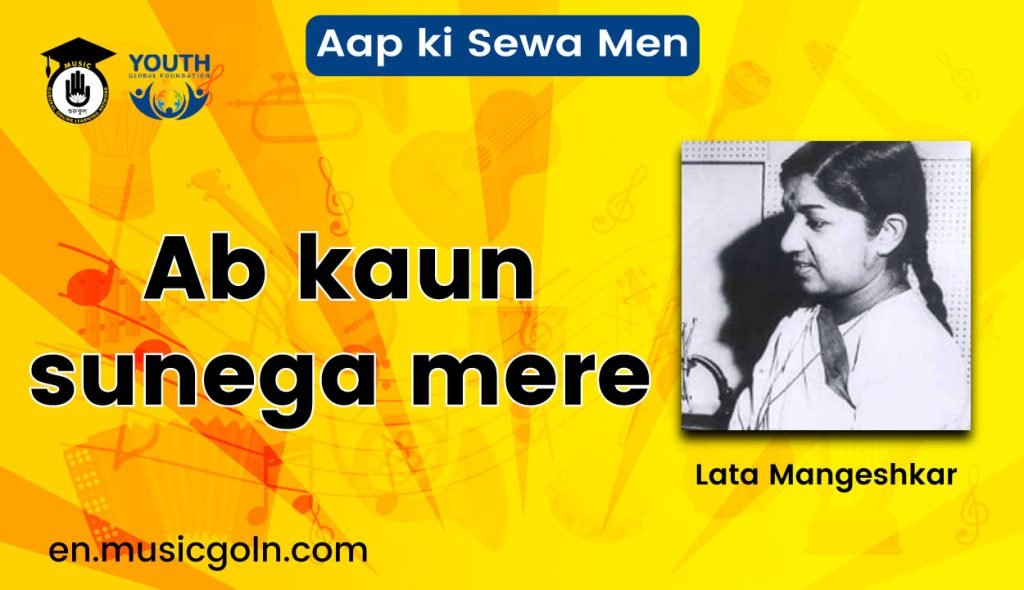Ab kaun sunega mere lyrics | Lata Mangeshkar | Aap ki sewa men | 1947
Singer: Lata Mangeshkar, Mohantara Talpade, Mohammed Rafi
Lyricist: Mahipal
Music Director: Datta Davjekar
Lata Mangeshkar was an Indian playback singer and occasional music composer. She is widely considered to have been one of the greatest and most influential singers in India.Her contribution to the Indian music industry in a career spanning eight decades gained her honorific titles such as the “Queen of Melody”, “Nightingale of India”, and “Voice of the Millennium.
In the 1950s, Mangeshkar sang songs composed by various music directors of the period, including Anil Biswas (in films such as Tarana (1951) and Heer (1956)),Shankar Jaikishan, Naushad Ali, S. D. Burman, Sardul Singh Kwatra, Amarnath, Husanlal, and Bhagatram (in films like Bari Behen (1949), Meena Bazaar (1950), Aadhi Raat (1950), Chhoti Bhabi (1950), Afsana (1951), Aansoo (1953), and Adl-e-Jehangir (1955)), C. Ramchandra, Hemant Kumar, Salil Chowdhury, Datta Naik, Khayyam, Ravi, Sajjad Hussain, Roshan, Kalyanji-Anandji, Vasant Desai, Sudhir Phadke, Hansraj Behl, Madan Mohan, and Usha Khanna.
She sang “Sri Lanka, Ma Priyadara Jaya Bhumi”, a song in Sinhala, for the 1955 Sri Lankan film Seda Sulang. Lata Didi recorded her first Telugu song Nidhurapora Thammudaa in 1955 Telugu film Santhanam for music director Susarla Dakshinamurthi.
She made her debut in Tamil playback singing with Vanaradham in 1956 (Uran Khotala dubbed in Tamil) with the Tamil song Enthan Kannalan for Nimmi in the dubbed version composed by Naushad
She sang many raga-based songs for Naushad in movies such as Deedar (1951), Baiju Bawra (1952), Amar (1954), Uran Khatola (1955) and Mother India (1957). Ae Chorre Ki Jaat Badi Bewafa, a duet with G. M. Durrani, was her first song for the composer Naushad. The duo, Shankar–Jaikishan, chose Lata for Barsaat (1949), Aah (1953), Shree 420 (1955) and Chori Chori (1956).
Before 1957, composer S. D. Burman chose her as the leading female singer for his musical scores in Sazaa (1951), House No. 44 (1955), and Devdas (1955). However a rift developed between her and Burman in 1957, and she did not sing his compositions again until 1962.
She won a Filmfare Award for Best Female Playback Singer for Salil Chowdhury’s composition “Aaja Re Pardesi” from Madhumati (1958). Her association with C. Ramchandra produced songs in movies such as Albela (1951), Shin Shinkai Bublaa Boo (1952), Anarkali (1953), Pehli Jhhalak (1954), Azad (1955), Aasha (1957), and Amardeep (1958). For Madan Mohan, she performed for films like Baagi (1953), Railway Platform (1955), Pocketmaar (1956), Mr. Lambu (1956), Dekh Kabira Roya (1957), Adalat (1958), Jailor (1958), Mohar (1959), and Chacha Zindabad (1959).
Her song Aye Maalik Tere Bande Hum which was the original composition of Vasant Desai and used in the film Do Aankhen Barah Haath on 1957, was adapted by a Pakistani school as the school anthem.
Ab kaun sunega mere lyrics | Lata Mangeshkar | Aap ki sewa men | 1947
Ab kaun sunega mere lyrics :
ab kaun sunega
ab kaun sunega, mere man ki baat
ab kaun sunega, mere man ki baat
jiske chute sakhi sahare
jiske chute sakhi sahare
uska kaho dhaar
ab kaun sunega, mere man ki baat
ab kaun sunega
jo karte the kabhi ishare
jo karte the kabhi ishare
dub gaye re chand sitare
dub gaye, dub gaye
dub gaye re chand sitare
raah dikhane aayi mujhko
raah dikhane aayi mujhko, tufano ki raat
ab kaun sunega, mere man ki baat
ab kaun sunega
jyot deeye ki jab bujh jaye
jyot deeye ki jab bujh jaye
aansu kya usko suljhaye
aansu kya, aansu kya
aansu kya usko suljhaye
bhar bhar aati ankhiya, ankhiya
bhar bhar aati ankhiya
man sukha sukha jaaye
ab kaun sunega, mere man ki baat
ab kaun sunega, mere man ki baat
ab kaun sunega
Read more:
